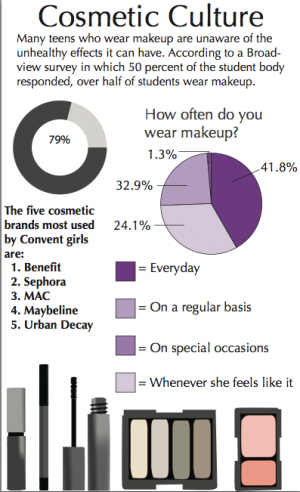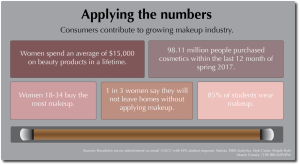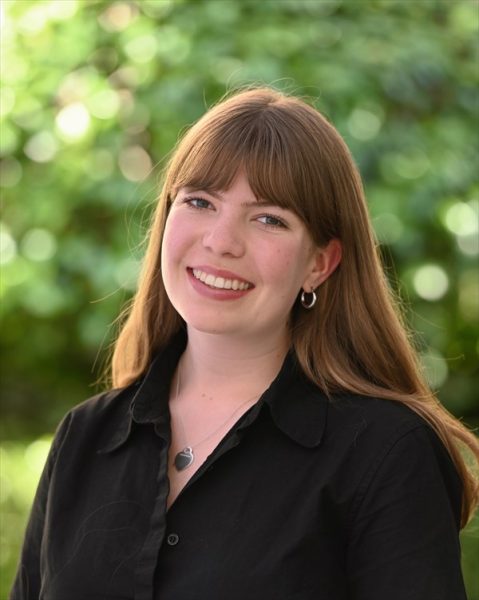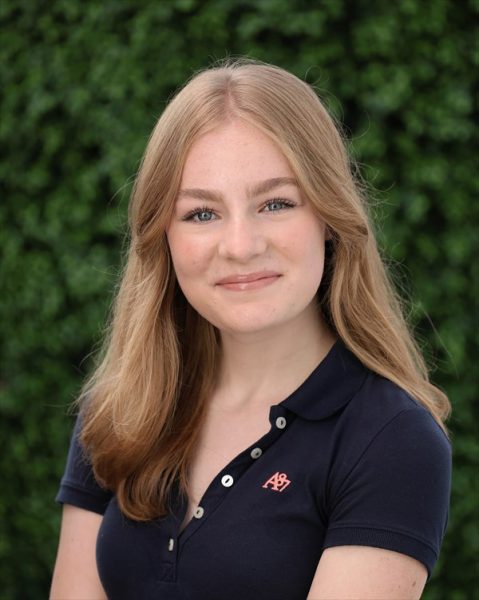Blending two worlds
Celebrities, social media change beauty branding.

December 16, 2017
With beauty vloggers on YouTube, regular celebrity product endorsements on Instagram, and an increased presence of cosmetic companies online, the makeup and beauty industry’s marketing strategies have changed with the advent of social media.
“When I see makeup on Instagram I think I may like, I usually look into buying it,” senior Madison O’Neill said. “It’s not just the ads. The people who show off the products have a huge impact because their videos give people the chance to see what products do and how they work before buying.”

Beauty brands that pair with social media platforms can gain awareness and stay relevant to their customers. Partnerships with YouTube stars or Instagram celebrities allow companies to access a larger audience, according to marketing and creativity consultant Michelle Busse Moran (’02), who works on video and content creation specifically for beauty and skincare brands.
“Some of the companies I have worked with have paid certain celebrities like the Kardashian girls for one Instagram post showing their product,” Moran said. “The effect is massive, leading products to sometimes even sell out completely. That’s the kind of attentive audience those a-list celebrities have online.”
After seeing Kylie Jenner’s heavy online and social media presence, junior Avery Van Natta says the reality TV star and model’s line of makeup, Kylie Cosmetics, is popular because of its branding style and not necessarily because of the products’ quality.
“I don’t wear makeup, but I got Kylie Jenner’s Lip Kits for my sister,” Van Natta said. “I guess I wanted to see the difference in how they are presented online versus what they are in reality. Honestly, when I bought the kit, I was more focused on the brand name because it is so well known.”
Other popular celebrities such as Kim Kardashian and Rihanna have released beauty lines of their own that are advertised similarly to Jenner’s.
“I bought Rihanna’s Fenty Beauty Trophy Wife Highlighter and Fenty Lip Gloss after seeing them on social media,” O’Neill said. “I think that people probably tend to lean towards makeup they see online because if something is everywhere, they probably think it’s good in some way.”
Entire beauty marketing departments are dedicated to promoting products through social media. With large financial and human resources devoted to a company’s online persona, makeup brands are able to further their name and reach a wider community, according Erin Dress (’02), Emerging Channels e-Commerce Team Lead at Unilever.
“Social media has become a more nuanced way to reach sub-segments of consumers with individualized messages that appeal to them and their needs,” Dress said. “From the brands I’ve worked with at Unilever, digital-leading brands are better able to drive market share and build extreme loyalty with their shoppers.”
Before the omnipresent world of social media, brands had to rely on their ads in magazines or newspapers, according to Moran.
“There is no way to measure consumer engagement and effectiveness with print ads,” Moran said. “With social media, companies are now able to see the data from online interactives, seeing click throughs and analytics of what works and what doesn’t.”
In an age in which consumers more often than not use wireless technology before paper and cable, industries like cosmetics are often directing their efforts towards teens and young adults to gain their lifetime support, according to Moran.
“As a young person on social media, I sort of expected Kylie Jenner’s products to be magical like how they are portrayed online,” Van Natta said. “The weren’t as amazing as they seemed and I probably wouldn’t buy her products again just because I am not drawn to the makeup itself but instead the ‘cool’ reputation they have.”













